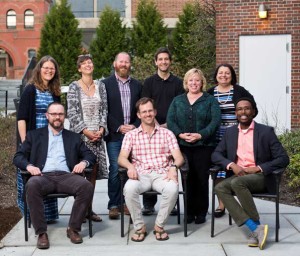As The Review has chronicled over the months since the Moving Dartmouth Forward address in Februaury, President Hanlon’s plan for residential life is to have clusters to which students will be assigned for their life at the College. This existence is to be supplemented with cluster-specific events and embedded “house professors,” who will live on campus near their assigned housing groups.
A Dartmouth Now press release announced that six residential professors were chosen out of an applicant pool to be embedded within the new housing system. “The six house professors named today include biologist Ryan Calsbeek, astrophysicist Ryan Hickox, engineer Jane Hill, sociologist Kathryn Lively, mathematician Craig Sutton, and Japanese literary scholar Dennis Washburn.” They will move in July 2015 and serve four-year terms.
This system of housing continuity has its advantages in the form of increased camaraderie among students; Dartblog author Joe Asch has long noted that his experiences as a ’79 were improved in the housing system of his time. In a blog post, he notes, “I lived in North Fayer for all of my terms on campus; the reason that I was able to do so was the system of dorm priority. The dorm that you lived in for your freshman year was forevermore your home dorm, and you had an absolute priority on an open room there when you returned to Hanover from your D-Plan peripatetics. The only folks who had priority over you were upperclassmen who themselves had lived in the same dorm in their own freshman year.”
Asch notes that residents of these dorms grew close after engaging in team activities, such as a smorgasbord of inter-dormitory sports. This allowed freshmen to diffuse into the College’s social scene through interactions with upperclassmen outside of the Greek system and the classroom. Asch asks rhetorically, “so what’s not to like about this system: socially cohesive dorms, the mixing of all four classes in one diverse residential setting, great group activities — and for many of us, a serviceable alternative to the fraternities?”
President Hanlon’s MDF ideas have touched on this area of student life, proposing to resurrect aspects of the old system — students will be assigned to one of six “house communities,” each consisting of a cluster with integrated professors and graduate students. While this is a step forward in developing new social spaces, the old question that haunted President Jim Wright’s 200 “Student Life Initiative” remains: how will dormitory equality be maintained?
An unlucky student who lost the housing lottery with an assignment to the River or the Choates currently can count on escaping his residence in the hive of scum and villainy after a year; to avoid consigning ’19s to such a fate for four years, the same solution from 2000 presents itself: raze the infamous clusters and build anew.
Logistical issues notwithstanding, one could read into Parkhurst’s motives a genuine concern for student life infected by the tendencies of Adam Smith’s “man of system.” Smith described this sort of mind in his Theory of Moral Sentiments as one who attempts to “arrange the different members of a great society with as much ease as the hand arranges the different pieces upon a chess-board,” differently from each “principle of motion of its own, altogether different from that which the legislature might chuse to impress upon it.” For, in the selection of leaders to guide the hearts and minds of pea-green freshmen, Parkhurst has chosen some professors who could be described as reflexively anti-Greek.
Ryan Calsbeek, chair of the faculty committee on student life, has been particularly persistent and vocal in his opposition to the Greek system, as a quick search of campus news will reveal. At a fall faculty meeting, Calsbeek motioned to proceed with a vote to abolish the Greek system, which passed 113-13. He, along with Dennis Washburn and Kathryn Lively, also signed a faculty petition (which had 239 adherents) advocating the elimination of Greek organizations. (The other three did not sign this petition, though whether because of apathy, unawareness, or opposition towards its aims is unknown; Ryan Hickox also may have abstained due to his position on the MDF Steering Committee at the time.)
In any case, this is a reason for concern and future investigation; we can only hope that the chosen professors will not cleave to this path but instead take into consideration Adam Smith’s exemplar:
The man whose public spirit is prompted altogether by humanity and benevolence, will respect the established powers and privileges even of individuals, and still more those of the great orders and societies, into which the state is divided. Though he should consider some of them as in some measure abusive, he will content himself with moderating, what he often cannot annihilate without great violence. When he cannot conquer the rooted prejudices of the people by reason and persuasion, he will not attempt to subdue them by force; but will religiously observe what, by Cicero, is justly called the divine maxim of Plato, never to use violence to his country no more than to his parents.


Be the first to comment on "College Announces Live-In Professors"